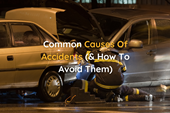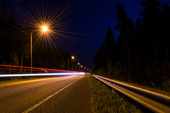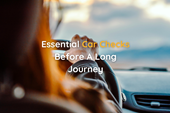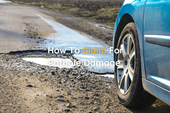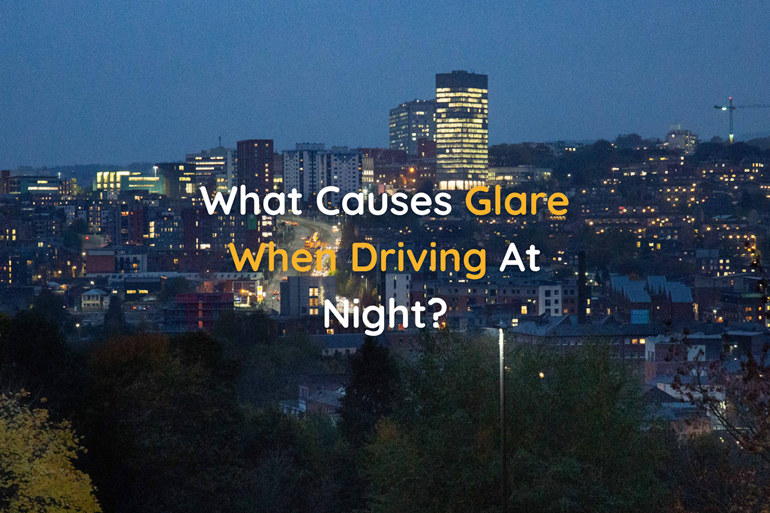
What Causes Glare When Driving At Night?
According to a new study, of the 34 million drivers on the road today, approximately 17 million have difficulty seeing in the dark. That means that one in every two drivers in the UK struggles to see clearly after dusk.
It can be incredibly frustrating and even dangerous to deal with oncoming headlights or bright streetlights shining in your eyes. This is because the glare from these lights can cause temporary blindness, making it difficult to see the road ahead. So it's essential to be aware of the potential causes and take steps to reduce the risk.
"If you wear glasses, ensure they are clean and free of smudges or scratches."
What are the causes of glare when driving at night? The glare experienced when driving at night can be due to both internal and external factors:
1. Internal causes of glare when driving at night
Uncorrected near-sightedness
If you have uncorrected near-sightedness, driving at night can be difficult because of the glare from oncoming headlights. This is caused by the fact that your eyes cannot focus on objects that are far away, so the light from the headlights appears scattered and blurry. This can make it difficult to see the road ahead – and be dangerous if you cannot see other cars on the road.
Astigmatism
Astigmatism is a vision condition that causes distorted images. It happens when the clear front part of the eye – or cornea – is curved – or when the lens inside the eye is misshapen. This can cause light to be refracted (bent) in different directions, which results in blurred vision. Astigmatism can cause glare while driving at night, as the light from oncoming headlights is not focused properly.
Allergies
Allergens can get into the eyes and cause irritation, redness, and swelling. The body's reaction to allergens can also cause the eyes to produce more tears. All these factors can cause glare and make it difficult to see.
Eye strain
Eye strain occurs when your eyes are used excessively or when they are exposed to bright light for extended periods. Symptoms of eyestrain can include headaches, fatigue, blurred vision, and difficulty focusing, making it difficult to concentrate on the road. If you experience any of these symptoms, you must take frequent breaks to rest your eyes.
Certain medications can cause photophobia
These medications can include certain antibiotics, antihistamines, and even some blood pressure medications. If you're taking any of these medications, it is vital to be aware of the potential side effects and take precautions when driving at night. If possible, avoid driving at night or in low light conditions.
Read More: What Are The Main Issues Following A Car Accident?
2. External causes of glare while driving at night
Fog
Fog can reflect light from nearby lights back into a driver's eyes. This can make it difficult to see the road ahead and be a safety hazard. To avoid this, drivers should be sure to use their headlights and taillights when driving in foggy conditions and be cautious when approaching other vehicles.
Night rain
Night rain can cause glare while driving due to the reflection of light off the wet pavement. This can make it difficult to see the road and can cause accidents. It is crucial to be extra careful when driving in these conditions and to slow down if necessary.
Oncoming headlights
Though it may seem like a minor issue, oncoming headlights can cause a lot of glare when driving at night. This is because our eyes are not used to seeing such bright lights in the dark, and they can cause us to squint or even close our eyes for a moment. This can be dangerous because it can make it difficult to see the road ahead. If oncoming headlights blind you, it is best to slow down and give yourself time to adjust to the light. If you wear glasses, ensure they are clean and free of smudges or scratches.
Foggy or cracked windshields
Foggy windshields can reduce visibility. Also, the light from oncoming traffic or streetlights can reflect off of the imperfections in the glass and into your eyes. This can make it difficult to see and can be dangerous.
To avoid accidents, it is crucial to be aware of both the internal and external causes of glare. By being aware of potential sources of glare, you can help keep yourself safe while driving at night.
Our Final Word
Night time glare is a growing issue, particularly as newer cars have more powerful headlights. However, if you struggle with glare due to medical conditions you should never ignore them!
Glare can cause problems for your motoring if you're involved in an accident, minor bump or scrape. To minimise your risk, consider Gap Insurance, which protects against negative equity, should your car be declared a total loss, Scratch & Dent Insurance, which covers minor damage without affecting your no claims and Alloy Wheel Insurance which can help keep your wheels in top condition; all risks associated with night time driving and glare.
Enjoyed reading? Don't forget to share this article with your friends. As always, get in touch with James or Luke if you have any questions; we're only a social media message away.




